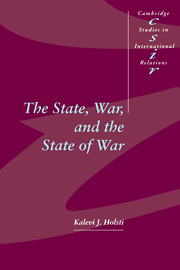Book contents
- Frontmatter
- Contents
- Preface
- 1 Thinking about war in international politics
- 2 Wars of the third kind
- 3 The formation of states before 1945
- 4 The creation of states since 1945
- 5 The strength of states
- 6 The perils of the weak: the state-strength dilemma
- 7 Wars of the third kind and international politics
- 8 Analyzing an anomaly: war, peace, and the state in South America
- 9 International responses to the weak state: managing and resolving wars of the third kind
- Appendix: Major armed conflicts by region and type, 1945–1995
- References
- Index
- CAMBRIDGE STUDIES IN INTERNATIONAL RELATIONS
7 - Wars of the third kind and international politics
Published online by Cambridge University Press: 05 May 2010
- Frontmatter
- Contents
- Preface
- 1 Thinking about war in international politics
- 2 Wars of the third kind
- 3 The formation of states before 1945
- 4 The creation of states since 1945
- 5 The strength of states
- 6 The perils of the weak: the state-strength dilemma
- 7 Wars of the third kind and international politics
- 8 Analyzing an anomaly: war, peace, and the state in South America
- 9 International responses to the weak state: managing and resolving wars of the third kind
- Appendix: Major armed conflicts by region and type, 1945–1995
- References
- Index
- CAMBRIDGE STUDIES IN INTERNATIONAL RELATIONS
Summary
According to popular expectations in 1989, once the decolonization process and the Cold War were over, peace should reign. The two main problems of the post-World War II era had been resolved: colonial peoples were free, and so were the subjects of communist rule. This was to be the dawn of a “new world order.”
Declarations of such an order following the American-sponsored coalition victory over Iraq in 1991 were soon met with skepticism and occasionally with sarcasms such as “the new world disorder.” There seemed to be a yawning gap between the hopes of the early post-Cold War era and the realities of continued carnage after 1991. The dilemmas of weak and failed states continued to spawn shocking statistics of lives lost and long lines of refugees fleeing to safe havens. Students of the Cold War, most of whom had been bedazzled by the intricacies of deterrence theory, deployment doctrines, and the introduction of new technologies capable of incinerating millions, discovered that wars of the third kind were ubiquitous in certain areas of the world and that the intellectual tools of Cold War era strategic studies were not particularly relevant to understanding them.
Decolonization and the collapse of communism solved only two problems – foreign and/or one-party rule. But gaining freedom is not the same as building viable states based on tolerant communities.
The war in ex-Yugoslavia brought to academic consciousness the factor of ethnicity in international relations. The most common understanding was that the Cold War had kept a lid on primordial ethnic hostilities, and that with its passing, old animosities were re-emerging.
- Type
- Chapter
- Information
- The State, War, and the State of War , pp. 123 - 149Publisher: Cambridge University PressPrint publication year: 1996



